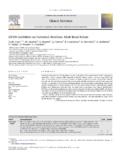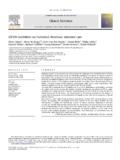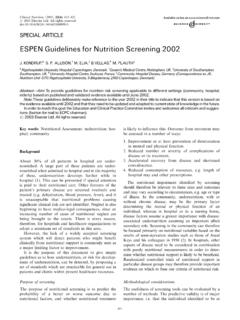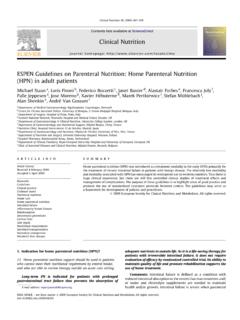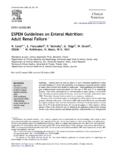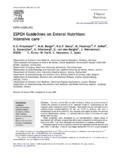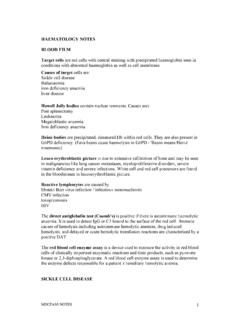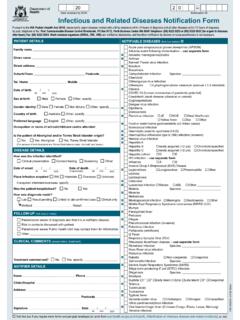Transcription of ESPEN Guidelines on Enteral Nutrition: Adult Renal Failure
1 ARTICLE IN PRESS. Clinical Nutrition (2006) 25, 295 310. ESPEN Guidelines . ESPEN Guidelines on Enteral Nutrition: Adult Renal Failure $. N. Canoa, , E. Fiaccadorib, P. Tesinskyc, G. Toigod, W. Drumle, DGEM:$$ M. Kuhlmann, H. Mann, Ho rl a Residence du parc, Centre Hospitalier Prive , Marseille, France b Department of Clinical Medicine and Nephrology, Universita degli Studi di Parma, Parma, Italy c Department of Internal Medicine, ICU, University Hospital, Plzen, Czech Republic d Istituto di Clinica Medica, Universita di Trieste, Trieste, Italy e Department of Internal Medicine III, Medical University, Vienna, Austria Received 20 January 2006; accepted 20 January 2006.
2 KEYWORDS Summary Enteral nutrition (EN) by means of oral nutritional supplements (ONS). Guideline; and tube feeding (TF) offers the possibility of increasing or ensuring nutrient intake Clinical practice; in cases where normal food intake is inadequate. These Guidelines are intended to Evidence based; give evidence-based recommendations for the use of ONS and TF in nephrology Enteral nutrition patients. They were developed by an interdisciplinary expert group in accordance (EN); with officially accepted standards and are based on all relevant publications since Oral nutritional 1985. They were discussed and accepted in a consensus conference. supplements (ONS); Because of the nutritional impact of Renal diseases, EN is widely used in nephrology Tube feeding; practice.
3 Patients with acute Renal Failure (ARF) and critical illness are characterized Acute Renal Failure ; by a highly catabolic state and need depurative techniques inducing massive nutrient Chronic Renal loss. EN by TF is the preferred route for nutritional support in these patients. EN by Failure ; means of ONS is the preferred way of refeeding for depleted conservatively treated chronic Renal Failure patients and dialysis patients. Undernutrition is an independent Abbreviations: EN, Enteral nutrition. This is used as a general term to include both ONS and tube feeding. When either of these modalities is being discussed separately this is specified in the text; Normal food/normal nutrition, normal diet of an individual as offered by the catering system of a hospital including special diets, gluten-free; lactose-free, etc.
4 Diets; ONS, oral nutritional supplements; TF, tube feeding; ARF, acute Renal Failure ; CRF, chronic Renal Failure ; CVVH, continuous veno-venous haemofiltration;. CRRT, continuous Renal replacement therapies; CAPD, continuous ambulatory peritoneal dialysis; RRT, Renal replacement therapy; RDT, regular haemodialysis treatment $. For further information on methodology see Schu tz et For further information on definition of terms see Lochs et Corresponding author. Tel.: +33 4918 38835; fax: +33 4918 38838. E-mail address: (N. Cano). $$. The authors of the DGEM (German Society for Nutritional Medicine) Guidelines on Enteral nutrition in nephrology are acknowledged for their contribution to this article.
5 0261-5614/$ - see front matter & 2006 European Society for Clinical Nutrition and Metabolism. All rights reserved. ARTICLE IN PRESS. 296 N. Cano et al. Dialysis; factor of survival in dialysis patients. ONS was shown to improve nutritional status in CAPD; this setting. An increase in survival has been recently reported when nutritional status CRRT; was improved by ONS. Malnutrition; The full version of this article is available at Undernutrition & 2006 European Society for Clinical Nutrition and Metabolism. All rights reserved. Summary of statements: Acute Renal Failure (ARF). Subject Recommendations Grade71 Number General Macronutrient requirements are not so much determined by acute Renal Failure (ARF) as by the severity of the underlying disease, the type and intensity of extracorporeal Renal replacement therapy, and by nutritional status and associated complications: Table 1.
6 Extracorporeal treatment induces increased losses of micronutrients which should be supplemented. Monitor micronutrient status because excessive C supplementation may result in toxicity. In ICU patients with ARF, the electrolyte content of C most 1500 2000 kcal Enteral formulae is usually adequate. However, requirements can differ and have to be assessed individually. Plasma electrolyte monitoring should avoid hypokalaemia and/or hypophosphataemia after initiation of Enteral nutrition (EN) (refeeding syndrome). Indications Undernutrition is the main but not the only indication for EN. In uncomplicated ARF use tube feeding (TF) if normal C nutrition and oral nutritional supplements (ONS) are not sufficient to meet estimated requirements.
7 In severe ARF, the recommendations for TF are the C same as for other ICU patients (see guideline Intensive Care''). If possible initiate EN within 24 h. Route In uncomplicated ARF, when spontaneous alimentation C is insufficient, ONS may be useful to meet estimated requirements. Use nasogastric tube as the standard access for the administration of EN. Jejunal tube placement may be indicated in the presence of severe impairment of gastrointestinal motility. In some cases where requirements cannot be met via C the Enteral route, supplementary parenteral nutrition may be needed. Type of formula Standard formulae are adequate for the majority of C patients. In case of electrolyte derangements formulae specific C for chronic Renal Failure can be advantageous.
8 Grade: Grade of recommendation; Number: refers to statement number within the text. ARTICLE IN PRESS. ESPEN Guidelines on Enteral Nutrition 297. Summary of statements: Conservatively treated chronic Renal Failure (CRF). Subject Recommendations Grade71 Number General An energy intake of 35 kcal/kgBW/day is associated A with better nitrogen balance and is recommended in stable CRF patients in the range of ideal body weight 710%. Overweight or undernourished patients may need adjustments of energy supply. Recommendations for protein intakes of metabolically B stable patients: Table 3. Recommendations for mineral requirements of B metabolically stable patients: Table 4.
9 Indications Use TF when adequate oral intake is not possible C despite nutritional counselling and ONS. Consider EN in: Patients with CRF and other catabolic intercurrent acute conditions in whom oral feeding is not possible. Treat these patients metabolically and nutritionally like ARF patients. CRF patients in whom adequate oral intake cannot be achieved. Consider overnight TF in order to optimize nutrient intake. Elderly patients with CRF may require special attention. The nutrient requirements and the need for nutritional support in elderly patients with Renal Failure have not been studied, although the prevalence of uraemic patients older than 75 years is increasing.
10 Type of Use standard formulae for short-term EN in C formula undernourished CRF patients. For EN45 days use special or disease-specific C formulae (protein-restricted formulae with reduced electrolyte content). Essential amino acids and ketoanalogues, in B association with very low protein formulae, are proposed to preserve Renal function. Grade: Grade of recommendation; Number: refers to statement number within the text. Summary of statements: Patients on maintenance haemodialysis therapy (HD). Subject Recommendations Grade71 Number General In acutely ill HD patients, the nutritional requirements are the same as in ARF patients. Macronutrient requirements of metabolically stable B patients: Table 5.
